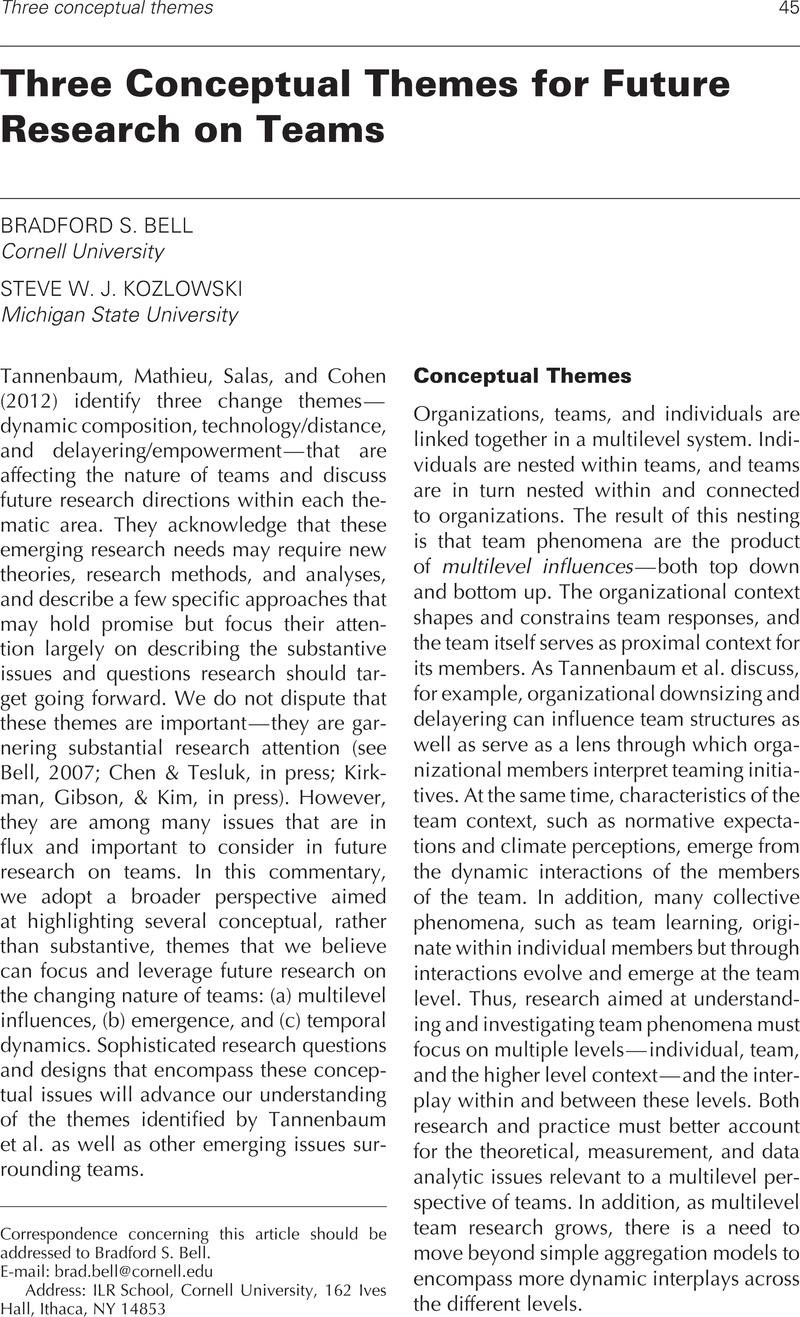Crossref Citations
This article has been cited by the following publications. This list is generated based on data provided by Crossref.
Tannenbaum, Scott I.
Mathieu, John E.
Salas, Eduardo
and
Cohen, Debra
2012.
On Teams: Unifying Themes and the Way Ahead.
Industrial and Organizational Psychology,
Vol. 5,
Issue. 1,
p.
56.
Климов, Алексей
2013.
Взаимосвязь целостности группы и эффективности групповой деятельности.
Психологические исследования,
Vol. 6,
Issue. 31,
Humphrey, Stephen E.
and
Aime, Federico
2014.
Team Microdynamics: Toward an Organizing Approach to Teamwork.
Academy of Management Annals,
Vol. 8,
Issue. 1,
p.
443.
Ellington, J. Kemp
and
Dierdorff, Erich C.
2014.
Individual Learning in Team Training.
Small Group Research,
Vol. 45,
Issue. 1,
p.
37.
Humphrey, Stephen E.
and
Aime, Federico
2014.
Team Microdynamics: Toward an Organizing Approach to Teamwork.
Academy of Management Annals,
Vol. 8,
Issue. 1,
p.
443.
Curseu, Petru Lucian
Schruijer, Sandra G. L.
and
Fodor, Oana Catalina
2016.
Decision rules, escalation of commitment and sensitivity to framing in group decision-making.
Management Decision,
Vol. 54,
Issue. 7,
p.
1649.
Fiore, Stephen M.
and
Wiltshire, Travis J.
2016.
Technology as Teammate: Examining the Role of External Cognition in Support of Team Cognitive Processes.
Frontiers in Psychology,
Vol. 7,
Issue. ,
Lazarević, Snežana
and
Lukić, Jelena
2018.
Team Learning Processes and Activities in Organization: A Case Study.
Economic Themes,
Vol. 56,
Issue. 3,
p.
301.
Shah, Sonali K.
Agarwal, Rajshree
and
Echambadi, Raj
2019.
Jewels in the crown: Exploring the motivations and team building processes of employee entrepreneurs.
Strategic Management Journal,
Vol. 40,
Issue. 9,
p.
1417.
Benishek, Lauren E.
and
Lazzara, Elizabeth H.
2019.
Teams in a New Era: Some Considerations and Implications.
Frontiers in Psychology,
Vol. 10,
Issue. ,
Handke, Lisa
Schulte, Eva-Maria
Schneider, Kurt
and
Kauffeld, Simone
2019.
Teams, Time, and Technology: Variations of Media Use Over Project Phases.
Small Group Research,
Vol. 50,
Issue. 2,
p.
266.
Nassif, Afif George
2019.
Heterogeneity and centrality of “dark personality” within teams, shared leadership, and team performance: A conceptual moderated-mediation model.
Human Resource Management Review,
Vol. 29,
Issue. 4,
p.
100675.
Nikoleizig, Lucie
Nestler, Steffen
Krause, Sascha
Moore, Don
and
Biesanz, Jeremy
2019.
Prediction of Group Performance: The Interplay of Individual Performance, Interpersonal Attraction, and Interpersonal Behavior.
Collabra: Psychology,
Vol. 5,
Issue. 1,
Lantz, Annika
Ulber, Daniela
and
Friedrich, Peter
2019.
The Problems with Teamwork, and How to Solve Them.
p.
278.
Dashuai, Ren
and
Bin, Zhu
2020.
How does paradoxical leadership affect innovation in teams: An integrated multilevel dual process model.
Human Systems Management,
Vol. 39,
Issue. 1,
p.
11.
Sinha, Ruchi
Chiu, Chia‐Yen (Chad)
and
Srinivas, Santosh B.
2021.
Shared leadership and relationship conflict in teams: The moderating role of team power base diversity.
Journal of Organizational Behavior,
Vol. 42,
Issue. 5,
p.
649.
Garrett, Lyndon E.
Gardner, Joel E.
and
Sciarappa, Shannon L.
2023.
Moving Beyond Team Structure: Musings About a Psychological Sense of Team.
Group & Organization Management,
Gerbl, Jennifer
and
Williams, Susan P.
2024.
Identifying Workgroup Dimensions and Their Implications for the Design of Digital Workspaces.
Procedia Computer Science,
Vol. 239,
Issue. ,
p.
265.



